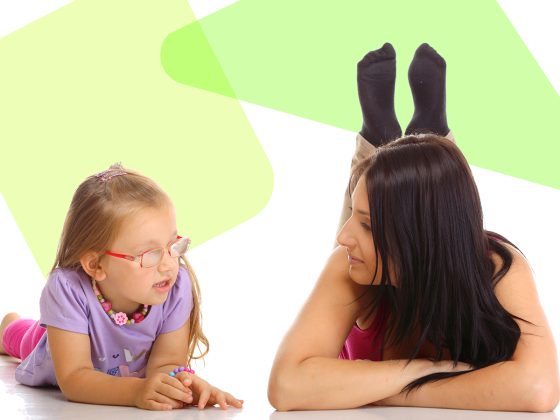
Questions & Answers
Suggestions for handling children’s difficult questions about addiction.
Here are some questions children might ask, and ways you might consider responding. Every conversation will be different, depending on children’s age, situation, and your relationship. For instance, 2- to 3-year-old children are less verbal, but, through their behavior, may give you a sense of what information they need. Take your cues from them and let that guide you in your responses.
Sometimes the best approach is to answer children by gently asking questions that help you better understand what they’re asking. For instance, “Are you worried about something?” “You seem concerned, what are you thinking about?” “Is there anything else you want to ask?”
Keep your answers short (one or two sentences). They might ask you more questions right away, or they might think about it and ask more later. Always let the kids know they can come to you with questions. Children may need to hear the answers again and again.
Why is Mom/Dad acting so strangely?
- Mom/Dad has a sickness called addiction. It’s a sickness that makes her/him feel that she needs to drink alcohol (a grown-up drink) or take a drug in order to feel okay.
- Alcohol or drugs can harm the body and mind. So, he/she needs help to get better.
- He/she is not a bad person; he/she has a disease that makes him/her lose control when drinking/using drugs. Drugs and alcohol do that; they make a person do and say things that they normally wouldn’t. They may also break promises, say unkind things, ignore others, hurt themselves or others, disappear for periods of time, or fall asleep at strange times.
Is it my fault?
- You are not the reason Mom/Dad drinks or uses drugs or alcohol. You did not cause this problem. It’s a grown-up problem.
- You cannot stop your parent’s drinking or drug use. It’s also not your job to fix it.
- No one else can control what someone with addiction does. Moms and dads have to decide to get help for this problem.
Can I catch the sickness?
- It’s not a sickness you can catch like a cold. (With children 5 and older, you might explain that addiction is a disease that can be passed on from parents to children, but that’s not always the case—when children learn about addiction and how to take good care of themselves, they’re less likely to have problems later. You might explain, “We all need to take care of ourselves so we can stay well/healthy in our bodies and minds. We can do this by making healthy choices such as eating healthy food, getting enough sleep, moving our bodies, playing with friends, and talking about our feelings.”)
Can he/she get better?
- Yes. If the person stops drinking or taking drugs, they can start to get better.
- People don’t get better just from stopping using drugs or alcohol. They need to get help to deal with their feelings. When they do, they will probably be happier, and things will probably be better at home.
- No one can make them stop, they have to decide to do it themselves when they are ready and ask for help.
- If a parent is in recovery: Mom/Dad is getting help (or got help) with the problem and is getting better. He/she will need to keep getting help to stay well. If the parent is not in recovery: He/she can get better.
- Just like children are always learning and growing, grown-ups are always learning and growing on the inside, too. They might have a really hard time sometimes, but if they can find the right grown-up helpers they need, they can learn and grow enough to make things better for themselves and their family.
Don’t they love me more than their drugs or alcohol? Why can’t they just stop?
- They love you very much. But when they are sick, their brain doesn’t work the way it should. When they get better, they’ll be better able to show their love more often.
- When someone gets used to doing something, even something that hurts them, it can be hard to stop. That’s why they need to continue to get help to get better.
Will he/she get sick again? When will he/she get better?
- It’s hard to say when someone might get better. They have to decide to, and they might need lots of help from other grown-ups.
- Sometimes people get better and then get sick again, and sometimes people get sicker before they get completely healed.
- Like any sickness, a person can get sick again. That happens a lot with this disease. But she can keep trying to get better. Many, many people do.
- He/she needs to try hard to not take drugs or drink alcohol. One thing that can really help him/her is going to meetings to talk with others who have the same sickness.
- Sometimes grown-ups need extra help to stay healthy and well. Usually, talking about their sickness helps.
Here are some things you can remind children of anytime:
- You are not alone. Many children have parents with addiction.
- It’s good for you to talk about what’s happening and how you feel. You can talk to friends, teachers, and other safe people who will listen to you and help.
- All families have hard times, but together they can work through them. Some times are harder than others.
- It’s okay to not have all the answers to things you don’t understand right now.

Plan and Protect
An article about planning for safe caregiving when dealing with substance use.
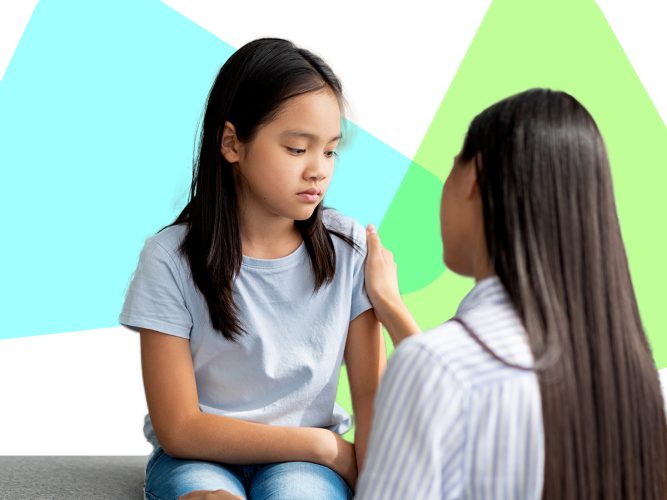
Guest Post: When Plans Don’t Go As Planned
When routines and plans get interrupted, there are ways to talk with children and show them that they’re still safe and loved.
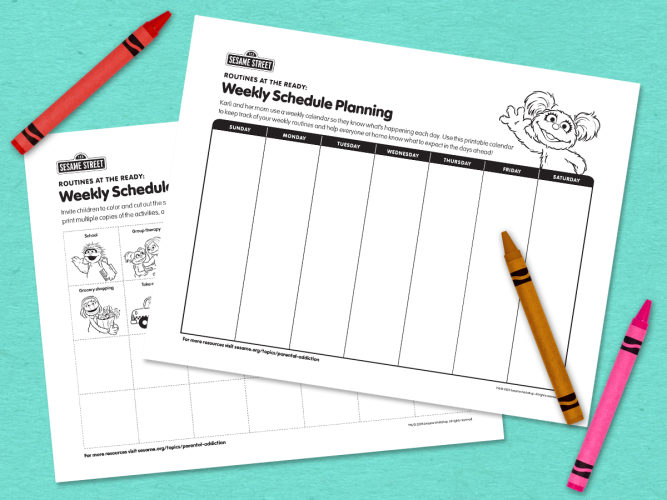
Routines at the Ready: Weekly Schedule
A printable tool for keeping up with routines.
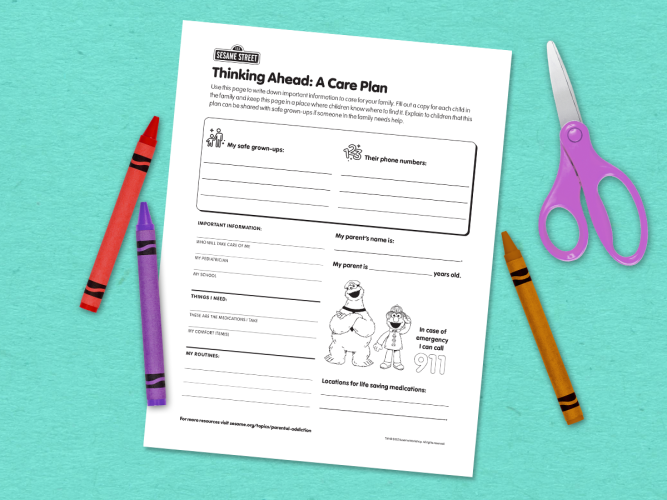
Thinking Ahead: A Care Plan
A printable page to help plan for children’s care in case of unexpected challenges.
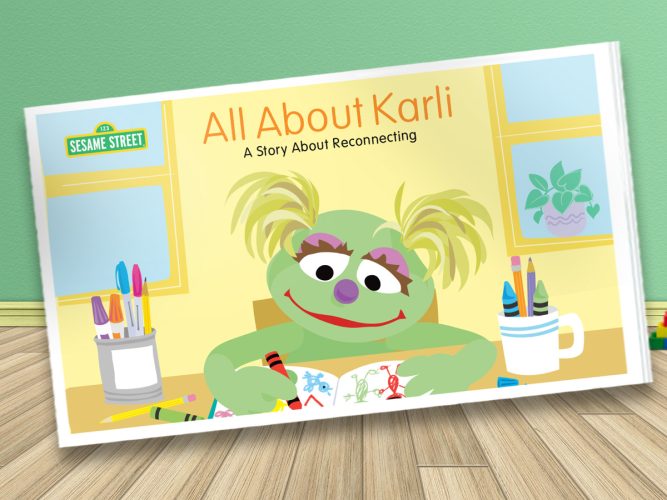
All About Karli: A Story About Reconnecting
A story about reconnecting after a parent and child’s time apart during recovery from addiction.
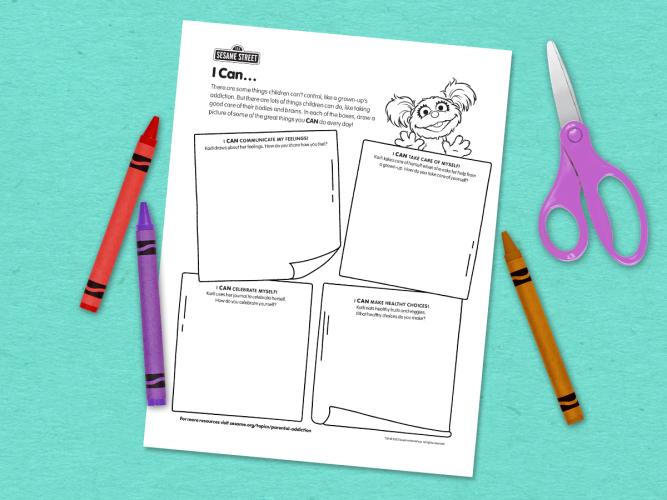
I Can Take Good Care of Myself
A printable page to remind children of all the ways they care for themselves.
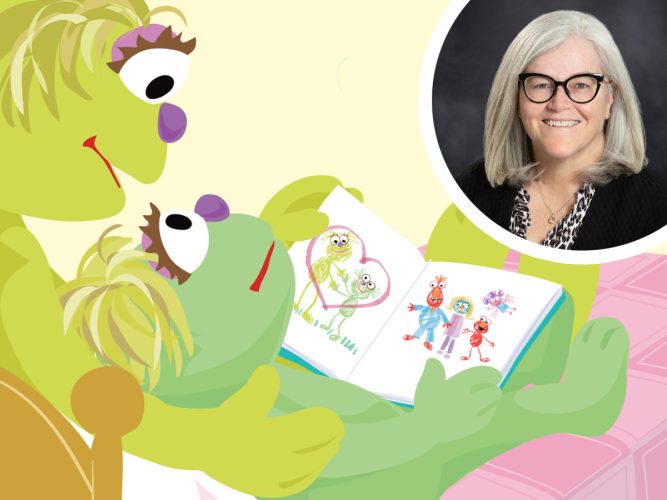
Supporting Whole Family Recovery with Sesame Street
A heartfelt and practical discussion on what it means to reunify as a family after treatment for addiction.
